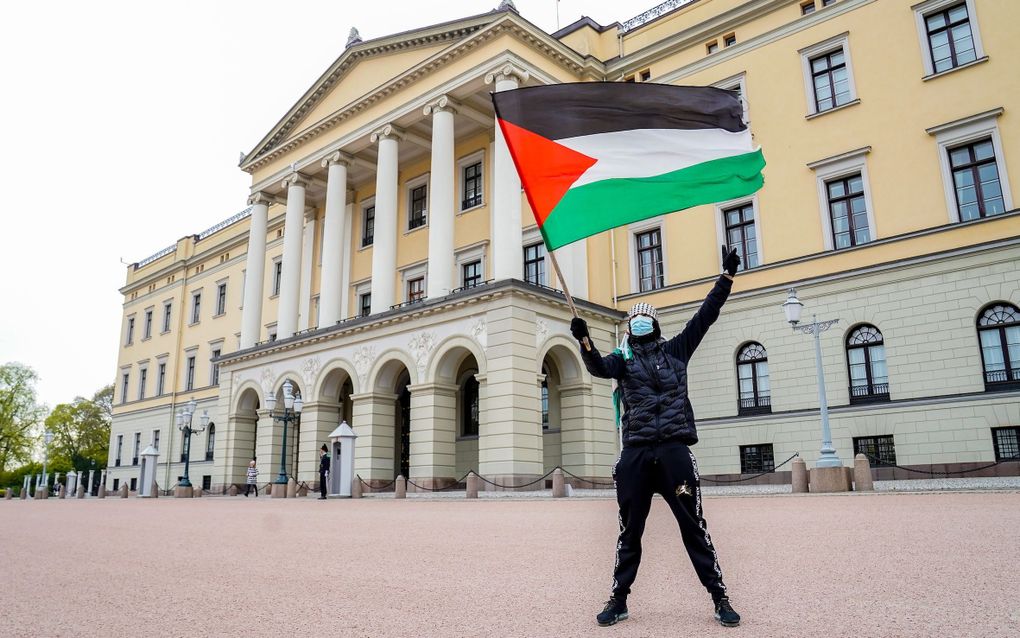City of Oslo still wants to boycott Israel because of occupation

A Palestinian flag in front of the royal palace in the City of Oslo, Norway. Photo EPA, Torsten Boe
Northern Europe
The City Council of Oslo is still planning to boycott Israeli products from the West Bank. The Norwegian parliament is sceptical about this step since foreign policy is a matter for the national parliament and not for city councils. But the ruling parties of the capital’s City Council continue to work on the promise made two years ago.
The Christian daily Vartland writes about this.
After the City Council elections in 2019, the Labour Party, the Socialist Left and the Greens made a clear promise in the political platform: international law would be applied to companies operating on the permission of the occupying power. This would lead to a municipal boycott.
Socialist Left leader in the Oslo City Council made it clear: “The Palestinian people have been living under illegal occupation for more than 50 years. It is a common global responsibility to contribute to lasting peace and the freedom of the Palestinians”, said Sunniva Holmås Eidsvoll.
Two years after the promise, the conclusion has not been taken yet. There is still debate about the “final wording”, according to a spokesperson.
Many boycott promises
Last week, the City Council in Oslo resigned after a crisis in the Green party. But all indications are that the same council will return soon because there is no majority for a right-wing alternative in the city council. Thus, the Labour Party, the Socialist Left and the Greens will continue fulfilling program promises.
Proposals for a boycott of Israel or a boycott of goods produced in Israeli settlements on the occupied West Bank have been promoted in county councils, city councils and municipal councils for over 15 years.
In 2005, Sør-Trøndelag County Council decided to boycott goods from Israel. The Ministry of Foreign Affairs and the then Minister of Foreign Affairs Jonas Gahr Støre (Labour Party) stated that the decision was illegal: A public body cannot discriminate between suppliers.
In the same year, Socialist Left encouraged a consumer boycott of Israel. After a few days, Socialist minister Kristin Halvorsen had to apologise: “As Minister of State and Minister of Finance, I should not have advocated a policy towards Israel that is not in line with Norwegian official foreign policy.”
In 2016, Trondheim and Tromsø decided that the municipalities will not buy goods from Israeli settlements on the West Bank. Later, Hamar, Lillehammer, Vaksdal and Rælingen have made similar decisions.
Several have done as Hamar, not make explicit decisions aimed at Israeli goods, but decisions that say that the municipality should not buy goods from “occupied territory”.
Two county municipalities have also made such decisions, Innlandet and Viken. “This is to take social responsibility”, says finance county councillor Halvard Ingebrigtsen (Labour).
In May, the Oslo bishop of the Norwegian Church, Kari Veiteberg, said that it was “ethical” to boycott Israeli in general to protest against the illegal occupation of the West Bank. This was reported by the Iranian news site Tasnim News.
A warning from parliament
The many municipal Israeli boycotts led the right-wing Progress Party to a resolution in April. The party asked, “the government to take the initiative for an amendment to the law so that municipalities and county municipalities will not have the opportunity to pursue local foreign policy.”
The national parliament, the Storting, has still to vote about this. All parties, minus Socialist Left, agree that local boycotts are problematic: “It can present challenges if the state on the one hand and municipalities and county municipalities, on the other hand, pursue different foreign policies”.
In 1993, Oslo gave its name to the peace accords. This plan was crowned with the Nobel Peace Prize for the Israeli leaders Rabin and Peres and the Palestinian leader Arafat.



